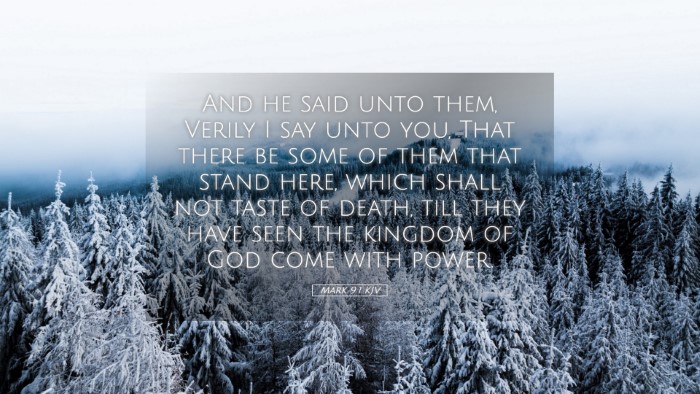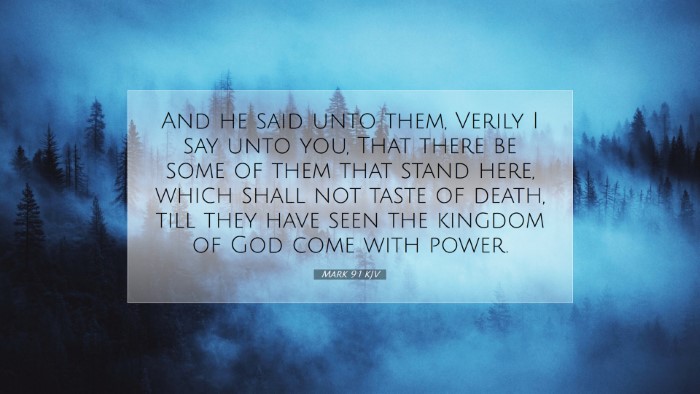Commentary on Mark 9:1
Verse: "And he said unto them, Verily I say unto you, That there be some of them that stand here, which shall not taste of death, till they have seen the kingdom of God come with power."
Introduction
This verse presents a profound statement made by Jesus, which has stirred extensive theological debate throughout the centuries. It serves as a pivotal reference point for understanding the immediacy of the Kingdom of God and the implications of Christ's ministry. Commentators have approached this text with various interpretations, addressing the challenges posed by the apparent contradiction between the statement of not tasting death and the universal experience of mortality.
Insights from Matthew Henry
Contextual Setting: Matthew Henry emphasizes the need to consider the context of Jesus' ministry at this juncture. He notes that Jesus was preparing His disciples for His impending passion, assuring them that despite the trials ahead, there would be a revelation of the Kingdom which they would witness.
Promise of the Kingdom: Henry posits that some of those present would witness significant manifestations of the divine authority of Christ through His miracles, resurrection, and ascension. The coming of the kingdom with power is interpreted as the exhibition of God's glorious reign through Christ's ministry in the world.
Faith and Assurance: The emphasis on 'verily' or 'truly' underscores the assurance Christ provides—it invites believers to trust in the fulfillment of God's promises, even amidst personal struggles and uncertainties.
Albert Barnes’ Perspective
Understanding 'Taste of Death': Albert Barnes adopts a slightly different angle, suggesting that the expression 'taste of death' is significant in understanding the eventual glorification of believers. He explains that some individuals present at Jesus' proclamation would not experience death before seeing the glory of the risen Christ, which took place during the transfiguration shortly thereafter.
Historical Context: According to Barnes, the statement also serves to fortify the disciples against despair as they approached the darker days of Christ's crucifixion. They were to take heart, knowing they would witness God's transformative power firsthand, reinforcing their faith.
Thoughts from Adam Clarke
The Nature of the Kingdom: Adam Clarke expands on what it means to see the 'kingdom of God come with power.' He articulates it as a strong affirmation of the new order arising from Christ's life and resurrection. Clarke correlates the phrase with not just a future expectation but a present reality as Jesus initiated His reign over sin and death.
Polemical Interpretations: Clarke addresses various interpretations that hinge on eschatological views and the belief in the second coming of Christ. He asserts that while there are fulfillments in the present, the ultimate realization of the Kingdom will be consummated in the eschaton. Thus, the verse tantalizingly balances present experience with future hope.
Common Theological Themes
- Immediacy of the Kingdom: Several commentators reflect on the immediacy with which the Kingdom of God is to be experienced, challenging believers to stay engaged with God's work in the present.
- Encouragement amidst Trials: The promise of witnessing the kingdom is a source of strength for believers, to encourage perseverance through trials and tribulations.
- Divine Assurance: As with Henry's emphasis on 'verily', the affirmation of divine truth provides a foundation for faith.
Application for Pastors and Theologians
In pastoral ministry, Mark 9:1 speaks volumes about the role of assurance in faith. Leaders are called to communicate hope to their congregations, helping them to understand that the Kingdom is both a current reality and future promise. This dual focus can empower believers, urging them to actively participate in God's work in the world.
For theologians, the verse invites deeper exploration of eschatological themes and invites contemplation on the nature of Christ’s kingdom. Engaging with historical and contextual perspectives enhances the richness of theological discourse, providing an opportunity to bring ancient texts into contemporary relevance.
Final Reflections
The statement made by Jesus in Mark 9:1 remains a powerful declaration of hope and expectation. As believers reflect on this verse, they are reminded of God's sovereign plan and the imperative to witness and proclaim the power of His Kingdom. The insights from trusted commentators such as Matthew Henry, Albert Barnes, and Adam Clarke offer invaluable perspectives that help ground contemporary faith in biblical truth.


